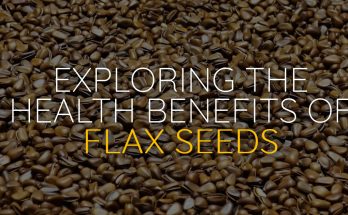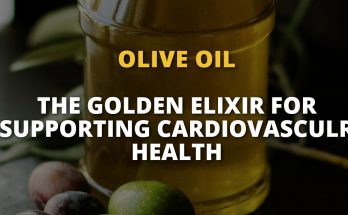There is a silent cuprit in the development of heart disease known as endothelial dysfunction.
Endothelial dysfunction can be defined as a systemic pathological disorder in the homeostatic function of the endothelium, an imbalance between vasodilating and vasoconstricting substances such as nitric oxide (NO).
Research suggests that endothelial dysfunction is a precursor, early warning and modifiable independent risk factor for athersclerosis, cardiovascular diseases and other vascular pathology.
In this article, we are going to explore the seven foods with the strongest scientific evidence for their ability to improve endothelial function.
1. Dark Chocolate & Cocoa Flavanols

A sweet way to start our list off with dark chocolate and cocoa flavanols.
Dark chocolate with a cocoa content of at least 70% is an excellent source of heart-healthy flavonoids.
These powerful phytochemicals have been extensively studied for their ability to improve endothelial function.
Dark chocolate’s flavonoids—particularly catechins and epicatechins—act as potent antioxidants, protecting the endothelial cells from oxidative stress and inflammation.
A summary of the current scientific evidence on dark chocolate, cocoa flavanols and endothelial function has concluded:
Current evidence indicated the beneficial effect of acute and chronic consumption of dark chocolate and flavonoids on FMD. – [1]
This meta-analysis provides evidence that cocoa flavanols could significantly improve endothelial function, with an optimal effect observed with 710 mg total flavanols, 95 mg (−)-epicatechin or 25 mg (+)-catechin. – [2]
Recommended Product: Aduna High-Flavanol Super Cacao Powder
2. Walnuts
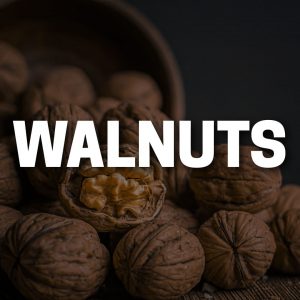
In the quest for a healthy heart, the answer may lie in a surprising but satisfying snack: walnuts.
These small but mighty nuts have garnered attention from researchers worldwide for their remarkable impact on heart health and endothelial function.
With high levels of alpha-linolenic acid (ALA), an essential omega-3 fatty acid, walnuts offer immense cardiovascular protection.
In addition to omega-3 fatty acids, walnuts contain a variety of antioxidants, such as polyphenols and vitamin E.
These antioxidants have been found to combat oxidative stress and free radicals in our body, which can be damaging to our cardiovascular system.
A systematic review and meta-analysis of randomized controlled trials published in 2018, evaluated the effects of walnut consumption on peripheral endothelial function (EF) in adults.
The systematic review and meta-analysis concluded:
The available evidence from RCTs suggests there may be a clinically relevant effect of walnut consumption on EF. – [3]
Nut consumption significantly improved endothelial function. However, the beneficial effect was limited to walnuts. – [4]
3. Beetroot

Beetroots, the earthy, vibrant purple coloured root vegetable, is a known powerhouse of nutrients for supporting cardiovascular health.
Rich in essential vitamins, minerals, and dietary antioxidants, beetroots are a natural source of nitrates, which play a crucial role in improving endothelial function.
Nitrates are transformed into nitric oxide (NO) within the body, which in turn stimulates the endothelium to relax blood vessels, leading to improved blood flow, reduced blood pressure, and enhanced overall endothelial function.
A summary of the current evidence on beetroot and inorganic nitrate supplementation for its effect on endothelial function has concluded:
Inorganic nitrate and beetroot supplementation was associated with beneficial effects on EF.
These effects appear to be reduced in older subjects and in subjects with greater cardiometabolic risk. – [5]
Beetroot inorganic nitrate supplementation significantly decreased Arterial Stiffness (Pulse Wave Velocity and increased Endothelial function. – [6]
4. Whey Protein

Whey is a rich source of proteins and biologically active peptides, which research has found to possess cardio-metabolic and many other health benefits.
Whey derived-peptides display numerous biological activities that may be beneficial to cardiovascular health including antioxidant, anti-hypertensive and hypocholesterolemic properties.
Hypercholesterolemia and hypertriglyceridemia are both considered risk factors for endothelial dysfunction.
A systematic review and meta-analysis of human intervention trials published 2021 summarised the effects of Whey Protein (WP) consumption on vascular reactivity, arterial stiffness and circulatory biomarkers of vascular function.
The systematic review and meta-analysis concluded:
The pooled analysis of six studies showed a significant increase in flow-mediated dilation (FMD) after WP consumption.
The overall results provided evidence supporting a protective effect of WP on endothelial function measured by FMD. – [7]
5. Green & Black Tea (Camellia Sinensis)

Tea made from infusing the dried leaves of the Camellia Sinensis plant is one of the most commonly consumed beverages worldwide and has a long-standing association for its potential cardiovascular health benefits.
Multiple studies have shown that tea consumption, due to its rich antioxidant content, can significantly reduce oxidative stress in the body.
Oxidative stress occurs when there is an imbalance between harmful free radicals and antioxidants in your system.
The magical compounds found in tea, known as catechins, are responsible for its potent antioxidant effects. Green tea, in particular, contains high levels of the catechin EGCG (epigallocatechin gallate).
One of the possible mechanisms behind teas heart-health benefits may lie in its ability to improve endothelial function.
Research has found that black and green tea consumption can reverse endothelial vasomotor dysfunction in a variety of different patient groups, such as those with coronary artery disease and in smokers.
A summary of the current scientific evidence on tea and endothelial function has concluded:
Moderate consumption of tea substantially enhances endothelial-dependent vasodilation.
This may provide a mechanistic explanation for the reduced risk of cardiovascular events and stroke observed among tea drinkers. – [8]
Short- and long-term black tea consumption reverses endothelial vasomotor dysfunction in patients with coronary artery disease. – [9]
These results suggest that green tea consumption reverses endothelial dysfunction in healthy smokers, possibly through its antioxidant effect. – [10]
Kick back, enjoy the rest of our article and sip on a cup of green tea, letting the antioxidants work their magic to protect your heart!
6. Isoflavone Rich Soy Products
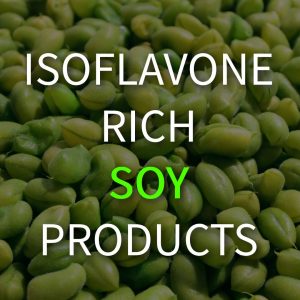
Incorporating soy-based products, such as tofu, tempeh, and soy milk, into our diets can provide us with a powerful food-group for supporting cardiovascular health.
Soybeans are a significant source of numerous heart-healthy phytochemicals such as isoflavones, phytosterols and lecithins, as well as soluble fibers, saponins and polysaccharides.
Unhealthy cholesterol levels, particularly elevated LDL cholesterol, are a significant risk factor for developing endothelial dysfunction.
Soy isoflavones and protein components have been found to significantly reduce serum total and LDL cholesterol levels, and possess hypocholesterolemic effect.
A Bayesian meta-analysis of randomized controlled trials published 2012 determined whether and to what degree exposure to isoflavone-containing soy products affects endothelial function.
The meta-analysis concluded:
Cumulative evidence from the RCTs included in this meta-analysis indicates that exposure to soy isoflavones can modestly, but significantly, improve EF as measured by FMD.
Therefore, exposure to isoflavone supplements may beneficially influence vascular health. – [11]
7. Olive Oil
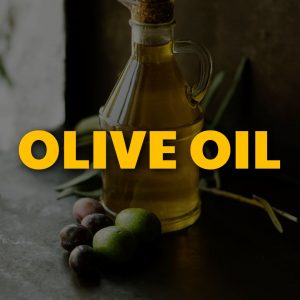
Finishing up our list of superfoods for supporting optimal endothelial function, we have the Mediterranean diet wonder Olive Oil.
Olive oil has been shown to exhibit numerous vasculoprotective and anti-atherosclerotic properties including antioxidant, anti-inflammatory, anti-hypertensive, lipid-lowering, hypoglycaemic, anti-thrombotic and several others.
Olive oil is a good source of heart-healthy monounsaturated fats (MUFA), polyphenols and Vitamin E, all of which play a role in the cardiovascular benefits of this versatile golden oil.
A summary of the latest scientific evidence on olive oil and endothelial function has found:
A number of studies revealed that olive oil phenolic compounds can amend endothelial function by increasing NOS expression levels, including iNOS and eNOS, hence increasing nitric oxide bioavailability. – [12]
We concluded that the consumption of a diet containing polyphenol-rich olive oil can decrease BP and improve endothelial function in young women with high-normal BP or stage 1 essential hypertension. – [13]
Values of flow-mediated dilatation (given as absolute percentage) were significantly more increased in individuals subjected to olive oil interventions (mean difference: 0.76% (95% CI 0.27 to 1.24), p < 0.002, n = 8 trials).
These results provide evidence that olive oil might exert beneficial effects on endothelial function as well as markers of inflammation and endothelial function, thus representing a key ingredient contributing to the cardiovascular-protective effects of a Mediterranean diet. – [14]
In the pursuit of a healthy heart, various dietary approaches have been explored, but none have garnered as much attention in recent years as the Mediterranean diet.
This celebrated way of eating, characterized by the abundance of fresh fruits, vegetables, whole grains, nuts, legumes, lean proteins, and healthy fats, has been hailed for its numerous health benefits, particularly in promoting cardiovascular health.
A central component of the Mediterranean diet pattern is olive oil, a quintessential ingredient that not only adds exquisite flavor to dishes but offers a plethora of heart-protective properties.
The Mediterranean diet is one of the diet patterns with the richest body of science supporting its cardiovascular health benefits.
Some of these benefits include the Mediterranean diet’s ability to improve endothelial function in adults:
MedDiet interventions improve endothelial function in adults, suggesting that the protective effects of the MedDiet are evident at early stages of the atherosclerotic process with important implications for the early prevention of CVD. – [15]
References
[8] Tea Consumption Enhances Endothelial-Dependent Vasodilation; a Meta-Analysis
[10] Green tea reverses endothelial dysfunction in healthy smokers
[12] Vasculoprotective Role of Olive Oil Compounds via Modulation of Oxidative Stress in Atherosclerosis
The information in this article has not been evaluated by the FDA and should not be used to diagnose, cure or treat any disease, implied or otherwise.
Always consult with a qualified healthcare professional before making any significant dietary or lifestyle changes including supplements and herbs.

